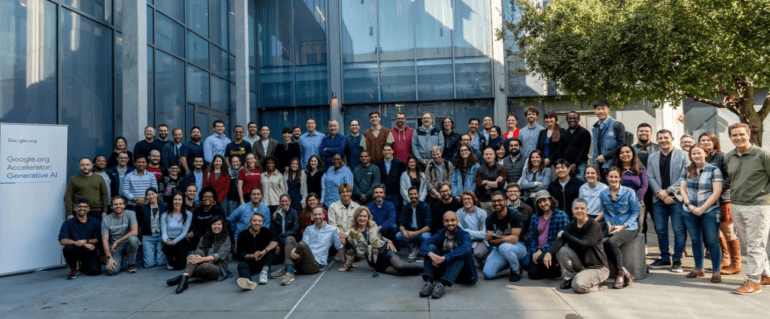- Google.org launches Accelerator: Generative AI to support nonprofits.
- Program offers mentorship, training, and funding for generative AI projects.
- 21 organizations were selected for the inaugural cohort, spanning various sectors.
- Projects include AI-powered assistance, coaching, and decision-making tools.
- Google.org invests over $20 million in funding and provides hands-on support.
Main AI News:
Google.org is proud to announce the launch of its newest initiative, the Google.org Accelerator: Generative AI, aimed at providing crucial support to nonprofits delving into the realm of generative AI. This groundbreaking program offers a comprehensive package including mentorship, technical training, and pro bono assistance tailored specifically for organizations leveraging generative AI to drive social impact.
Generative AI holds immense potential to revolutionize the way social impact initiatives operate, enabling teams to enhance productivity, foster creativity, and maximize effectiveness in community service endeavors. According to recipients of Google.org funding, AI integration has resulted in achieving project objectives in significantly reduced timeframes, with cost savings of nearly half the usual expenditure.
Despite widespread recognition of the potential benefits, a substantial portion of nonprofits are yet to embrace generative AI due to various barriers such as limited access to tools, inadequate awareness, insufficient training resources, and funding constraints. In response to these challenges, Google.org is launching the Accelerator program, a six-month intensive initiative aimed at empowering nonprofits to harness the full potential of generative AI in their endeavors.
The inaugural cohort of the Google.org Accelerator: Generative AI comprises 21 distinguished organizations spanning diverse sectors, including climate action, economic empowerment, healthcare, education, and crisis response. These nonprofits will receive not only technical training, workshops, and mentorship but also dedicated pro bono support from seasoned AI experts.
Furthermore, Google.org is investing over $20 million to fuel the projects undertaken by these organizations, demonstrating its commitment to driving positive change through technology. In addition to direct financial support, teams of Google professionals will collaborate closely with select nonprofits through the Google.org Fellowship, providing hands-on assistance in developing and implementing generative AI solutions.
Now, let’s delve into the transformative projects spearheaded by some of the selected organizations:
- Benefits Data Trust: Leveraging Large Language Models (LLMs) to develop an AI-powered assistant facilitating access to public benefits for low-income individuals.
- Beyond 12: Pioneering a generative AI-driven College Coach to offer scalable coaching support to first-generation college students.
- CareerVillage: Expanding the capabilities of its AI Career Coach to empower underrepresented individuals in navigating career trajectories.
- Climate Policy Radar: Building an AI-enabled database and knowledge graph for climate law and policy, facilitating evidence-based decision-making.
- CodePath: Introducing AI tutoring solutions to deliver personalized career support to underserved communities.
- EIDU: Providing personalized tutoring services in low- and middle-income countries through generative AI-driven digital learning exercises.
- Full Fact: Developing a generative AI tool to analyze and summarize health misinformation, aiding fact-checking efforts.
- IDinsight, Inc.: Offering prompt generative AI-powered responses to health inquiries from new mothers in South Africa.
- Jacaranda Health: Scaling digital health services using Natural Language Processing (NLP) tailored to African languages.
- Justicia Lab: Creating an AI assistant to guide immigrants through legal processes towards attaining legal status.
- Materiom: Developing a generative AI tool to facilitate the formulation of compostable biomaterial recipes.
- mRelief: Designing an assistant to streamline the application process for Supplemental Nutrition Assistance Program benefits.
- Opportunity@Work: Enhancing employability insights for employers through AI-driven career path analysis.
- Partnership to End Addiction: Improving addiction support services using AI-enabled training simulations.
- Quill.org: Introducing an AI-powered feedback tool to enhance student writing and reading comprehension skills.
- Tabiya: Empowering jobseekers in low- and middle-income countries with tailored career advice.
- Tarjimly: Utilizing AI-powered translation to assist human translators in refugee contexts.
- U.S. Digital Response: Advising governments on effective generative AI utilization for improved service delivery.
- World Bank: Developing a generative AI tool to facilitate evidence-based decision-making in development research.
These groundbreaking initiatives underscore the immense potential of generative AI to drive positive social change and pave the way for a more inclusive and equitable future. Stay tuned for updates on these transformative projects and explore more about Google’s commitment to fostering innovation through accelerator programs.
Conclusion:
The launch of Google.org’s Accelerator: Generative AI signifies a significant advancement in leveraging technology for social impact. By providing extensive support to nonprofits, Google.org is fostering innovation and driving positive change across diverse sectors. This initiative underscores the growing importance of AI in addressing societal challenges, offering promising opportunities for both nonprofit organizations and the broader market to embrace transformative technologies for social good.

